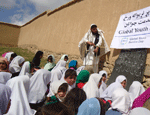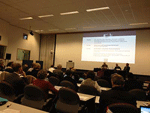Published on Fri, 2013-05-24 00:00
In September 2000, when the Millennium Summit was held at the UN General Assembly, Afghanistan was suffering from conflict and could not participate in the formulation of Millennium Development Goals (MDGs). The Government endorsed the Millennium Declaration as well as the MDGs only in March 2004. However, having lost over two decades to war, it has had to modify the global timetable and benchmarks to fit local realities. The rest of the international community defined the MDGs to be attained by 2015, against a baseline of 1990. Because of its lost decades and the lack of available information, Afghanistan has defined its MDG contribution as targets for 2020 from baselines of 2002 to 2005. Despite extreme poverty, ill health, and hunger, Afghans define the lack of security as their greatest problem. Hence the Government of Afghanistan has added this new goal to the eight global MDGs recognizing the critical role of peace and security in achieving the other MDGs. |
Published on Thu, 2013-05-23 15:09
For the past one week, the poorest members of the World Trade Organisation (WTO) have been locked in a battle against the united might of the richest countries to exercise their right to be exempt from the WTO intellectual property rules. Last November, the least developed countries (LDCs) invoked Article 66.1 of the Agreement on Trade-Related Aspects of Intellectual Property Rights (TRIPS) to request an unconditional extension of the transition period for as long as they remain as LDCs. The rationale is to allow LDCs to have policy space while they overcome their constraints and develop a viable technology base. The battle is over the terms of the exemption. |
Published on Wed, 2013-05-15 13:11
Funders play a critical role in the increasingly urgent project of strengthening the capacity of global and local citizen movements to actively engage in the design and implementation of international instruments and standards. In particular, the coming three to five years will be a pivotal time for citizen movements for human rights and human dignity throughout the world. An opinion column by Tanya Dawkins, co-chair of the Coordinating Committee of Social Watch. |
Published on Wed, 2013-05-15 00:00
Robert McNamara was Defense Secretary of the US when President Lyndon B. Johnson started the "War on Poverty". Inspired by this experience, as president of the World Bank, McNamara began in 1973, a global fight against absolute poverty, which he promised to eradicate "by the end of this century." Years later, Republican President Ronald Reagan mocked his Democratic predecessor saying that "LBJ declared war on poverty ... and lost ". The same can be said of McNamara. Forty years after this global war started, the World Bank now marks 2030 as the date for completion. To avoid the embarrassment of another defeat, on top of decades of delay, the Bank seems to be lowering the bar that measures progress. McNamara drew the line of absolute poverty at 30 cents, or its equivalent in purchasing power of each national currency. |
Published on Tue, 2013-05-14 17:18
The main problem with the MDGs, globally, is that the overall approach towards development they represent is quite narrow, limiting countries’ incentives to institute structural changes that would foster development. This is particularly evident in the case of Goal 2: ‘Achieve Universal Primary Education,’ which excludes economically active people in developing countries who are in need of further education, re-skilling or vocational training. Using the case of Cyprus, we can examine how the Lifelong Learning strategy it adopted made the link between LLL and sustainable development, and ask whether the Cyprus model provides a potential model for developing countries in the post-MDG agenda. |
SUSCRIBE TO OUR NEWSLETTER







